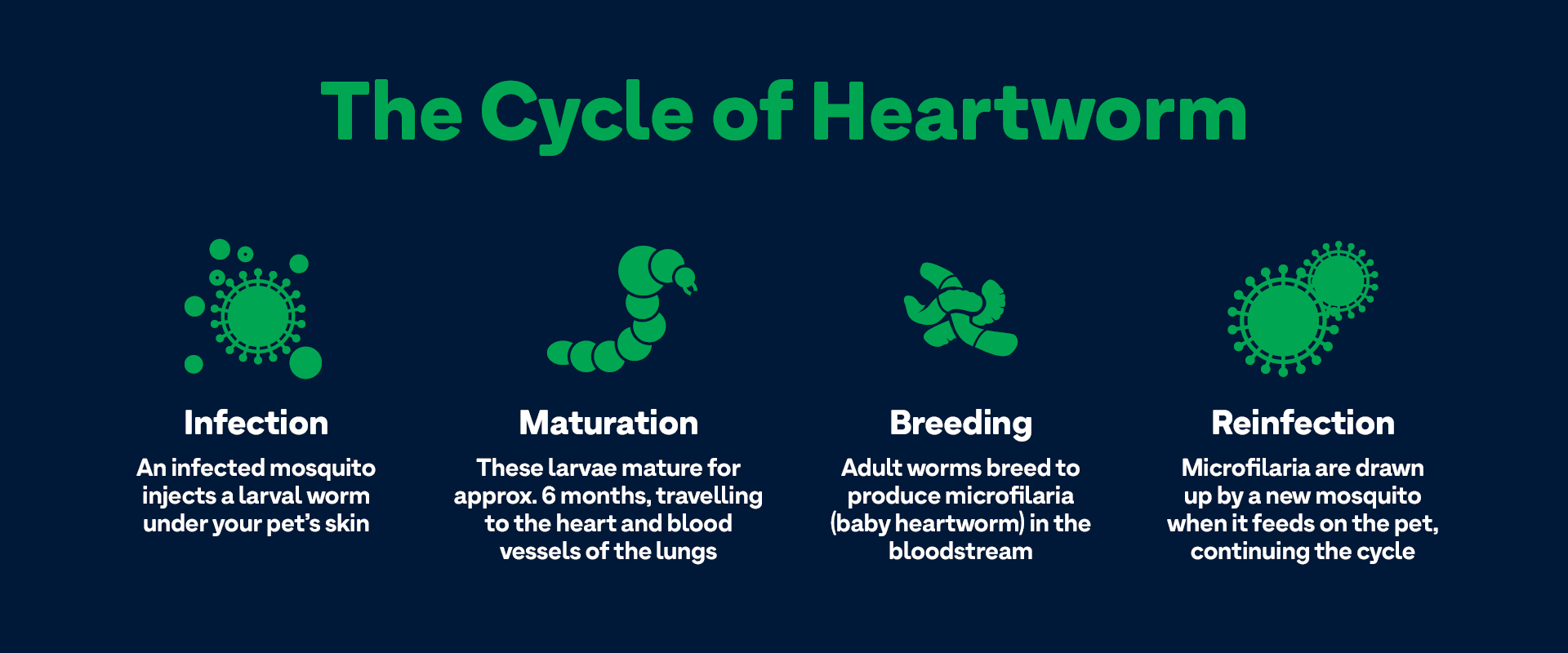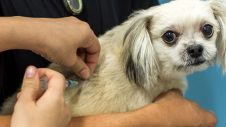Adult heartworm
Heartworms live in the right-hand side of the heart and in the blood vessels going to the lungs. They cause damage to the lining of these blood vessels and cause the formation of small blood clots in the blood vessels deeper in the lungs. They can also cause inflammation in the delicate lung tissue around the airways in the lungs. In the early stages, there may be no obvious clinical signs. With time, the damage worsens. Signs include:
- coughing
- decreased fitness
- weight loss.
In severe cases the heart, the liver and kidney will start to lose functional capacity, causing serious health problems.
Microfilaria
Microfilaria are immature or ‘baby’ heartworms which are produced by the adult worms in the heart. They live in the bloodstream and can be transferred from animal to animal through mosquito bites.

A thorough health assessment
Proper diagnosis is essential to determine if your pet’s health is good enough to have the treatment. This may involve a urine test, blood test, and chest X-rays.
The basic treatment schedule
Heartworm has three treatment phases.
- The first phase – The pre-treatment phase – may not be required in all cases. This involves using medication at home to try and reduce some of the effects of heartworm infection such as blood clot formation and roughening of the blood vessel lining. Can involve two to three weeks of oral medication.
- The second phase – Adulticide treatment – involves the injection of a drug to kill the adult heartworm.
- The third phase – Microfilarial treatment – involves a day stay in the hospital to kill the baby heartworm.
Immiticide is the only drug currently available for heartworm therapy. It is administered by two injections 24hrs apart, or in some cases, treatment may be split.
The split treatment is where a single initial injection is given. After one month of rest at home, your dog returns to have the full two-injection course.
A post adulticide checkup is recommended one week after the administration of the adulticide drug. Two weeks after this, a final blood test is performed. If this test is negative, treatment is finished and heartworm prevention is commenced.
Potential complications of treatment
There are a number of concerns with regard to treatment.
Once a drug has been administered to kill adult heartworm, these worms die over the next 5-14 days and are carried in the blood flow into the lungs. Each of the worms will block one of the many small blood vessels deep in the lungs. Because there are so many of the small blood vessels, blockage of a few may not cause outward signs of illness.
However, if a significant number of worms dislodge together and blockade more major blood vessels, then this may damage a large portion of the lung and can pose a serious problem. This event is called a thromboembolism. The better your pet is kept confined and rested, the lower the risk of thromboembolism.
In severe cases, there is a risk of permanent damage to the heart and lungs requiring on-going medication. It is usually possible before treatment to predict which dogs may be left with residual damage.
Immiticide has no liver or kidney toxicity. It is very effective against heartworm and will kill virtually 100% of the worms. It can be used as:
a) standard treatment – two injections 24hrs apart
b) split dose treatment – for dogs that are severely affected with heartworm or in an attempt to reduce the risk of thromboembolism
In the split dose regime, the first injection kills 30 – 40% of the worms and the remainder are killed when the two follow up injections are given. This enables your dog’s body to cope with the dead worm load more gradually and thus reduces the risk of lung damage.
Heartworm is a serious and often fatal condition. Prevention of heartworm is the best course of action. Contact your local Greencross Vets to discuss your pet’s heartworm prevention plan.

 Greencross Vets
Greencross Vets 










